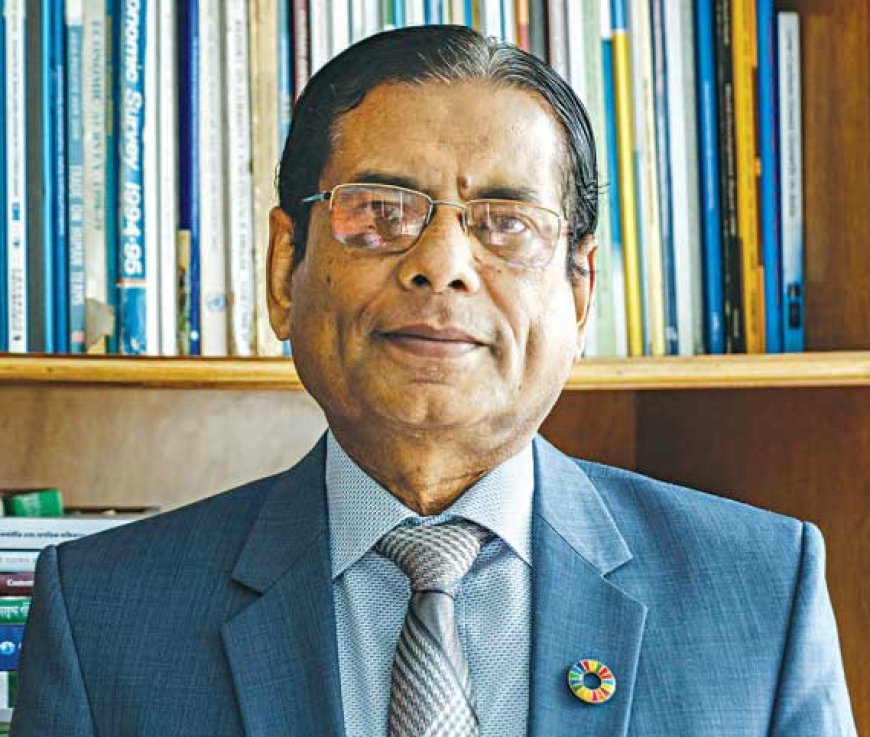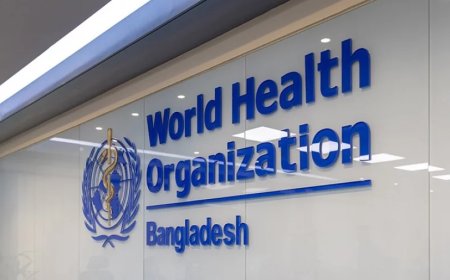Interview: Mustafizur Rahman, "Attaining LDC status is a choice, but exiting it follows a predetermined process"
Mustafizur Rahman, a distinguished fellow at the think tank Centre for Policy Dialogue (CPD), discusses with Prothom Alo's Monoj Dey the economic situation during the seven months of the interim government, strategies for recovering laundered money, the challenges and realities of transitioning from LDC status, and the effects of Trump's tariff war.

Prothom Alo: Seven months have passed since the interim government assumed office. How much progress has been made in stabilizing the struggling economy?
Mustafizur Rahman: When the interim government took charge, the economy was under significant strain due to years of accumulated pressure. Inflation was high, investment had stalled, and currency exchange rates had declined sharply, leading to import-driven inflation. The banking sector was in disarray, with rising default loans, deposit withdrawal challenges, and capital outflows. As a result, banks charged high-interest rates on loans, negatively impacting investments. Additionally, foreign exchange reserves dwindled, and infrastructure costs soared, further aggravating economic distress.
The National Board of Revenue (NBR) struggled to improve revenue collection. It failed to transition the tax system from indirect to direct taxation, with indirect taxes still comprising two-thirds of total collections. Instead of focusing on direct taxation, authorities increased the tax burden on the general public through higher VAT and other levies. Consequently, the country’s annual development programs relied heavily on both local and foreign funding, a situation that has now been inherited by the interim government.
Prothom Alo: The public holds high expectations from the interim government…
Mustafizur Rahman: Many expected the interim government to quickly resolve deep-rooted economic challenges, such as inflation, unemployment, and investment stagnation. However, this was unrealistic given the magnitude of the issues. The government had to balance public expectations while addressing these longstanding economic problems.
In the latter half of last year, widespread labor unrest and supply chain disruptions further stalled economic activities, worsening inflation and hindering job creation. These issues persisted into the first quarter of this year. However, positive changes have been observed in recent months. The economy, after hitting rock bottom, is showing signs of recovery.
One notable achievement has been the increase in remittance inflows, supported by efforts to encourage expatriates to use formal banking channels instead of illegal money transfer methods such as hundi and hawala. This shift has helped prevent capital flight and boosted foreign exchange reserves. Additionally, exports have grown by 12%, with reduced trade mispricing contributing to stability in international trade. This has helped stabilize foreign reserves, exchange rates, and import costs.
While import restrictions have eased and the supply of winter vegetables has improved, rice prices continue to rise. Timely rice imports and stockpiling, along with measures like increased Open Market Sales (OMS) and family ration cards, are necessary to address food inflation. Despite inflation declining slightly, purchasing power remains weak as wage growth lags behind price levels.
The biggest challenge ahead is increasing investment. A contractionary monetary policy has led to high-interest loan rates, while rising gas and electricity costs add to business expenses. Although the government justifies these price hikes as a consequence of previous mismanagement, businesses and consumers ultimately bear the burden.
Prothom Alo: During the previous administration, a significant amount of money was illicitly transferred abroad. Can it be recovered?
Mustafizur Rahman: Two critical steps are needed: preventing further capital flight by ensuring institutional independence and working towards repatriating laundered funds.
A white paper on the economy revealed that approximately $16 billion was siphoned out of the country, amounting to 5% of GDP. Many default loans were laundered abroad, while corruption networks smuggled money to destinations like Dubai, Singapore, Malaysia, the UK, the US, and Canada. These transactions were deliberately obscured through multiple intermediaries, making it difficult to trace the funds. However, retrieving the money is crucial.
Other nations, such as Angola, the Philippines, and Malaysia, have successfully reclaimed illicitly transferred funds. To achieve the same, Bangladesh must establish a special tribunal for swift legal action. Trade mispricing—where imports are over-invoiced and exports are under-invoiced—has been a major method of capital flight. Gold smuggling has also played a role, with reports indicating that a substantial amount of gold imported from the UAE was unaccounted for, exposing an organized money-laundering network.
Recovering these funds is necessary for three reasons:
-
The money belongs to the country and must be reclaimed.
-
The perpetrators must be held accountable and exposed.
-
This will serve as a deterrent against future financial crimes.
While the Bangladesh Bank governor has expressed optimism about recovering these funds, the process is complex. A strategic roadmap should be created for the next elected government to follow.
Prothom Alo: The government has taken steps to repatriate the laundered money. Are they sufficient?
Mustafizur Rahman: Bangladesh Bank has formed a task force, and agencies like the Financial Intelligence Unit and the Anti-Corruption Commission are actively working on this issue. They have sought information from foreign counterparts and signed international agreements. However, forensic financial expertise is essential to track these funds. The government must allocate resources for such investigations and leverage global expertise in financial crime detection.
Prothom Alo: The interim government seemed uncertain about whether to delay Bangladesh’s graduation from LDC (Least Developed Country) status. What is the latest stance?
Mustafizur Rahman: The government has clarified that Bangladesh will graduate from LDC status on November 24, 2026, which is a positive step. However, concerns persist, especially in the ready-made garments (RMG) and pharmaceutical sectors. Currently, 70% of Bangladesh’s exports benefit from tariff-free access to major markets. After LDC graduation, the country will face tariffs of 11.5% in the UK and EU, 15% in Canada, and additional duties in India and China.
Bangladesh’s pharmaceutical industry also enjoys patent exemptions under LDC provisions, allowing the production of generic drugs without licensing fees. This advantage will be lost post-graduation, exposing local businesses to tougher global competition.
Nonetheless, LDC graduation is an inevitable process, not a choice. It reflects Bangladesh’s achievements in economic growth, human development, and climate resilience. Nepal is set to graduate in 2026, and Bhutan has already done so. Remaining an LDC would place Bangladesh alongside war-torn Afghanistan, which is not a favorable image.
Prothom Alo: How prepared is Bangladesh for the post-LDC transition?
Mustafizur Rahman: Businesses must transition from dependency on preferential trade benefits to competing based on efficiency and innovation. Currently, high-interest loans, rising gas prices, and port inefficiencies increase business costs. These challenges must be addressed to maintain competitiveness.
Export incentives and tax breaks will no longer be permissible under WTO rules. Thus, Bangladesh must enhance productivity and reduce export costs. The EU and Canada will provide a three-year grace period for tariff-free access, but Bangladesh should also negotiate similar arrangements with India and other partners. While Vietnam has signed free trade agreements with 52 countries, Bangladesh has only signed one (with Bhutan). Expanding trade agreements is crucial.
Discussions with Japan on a bilateral trade deal are promising, but similar efforts must be accelerated with other nations.
Prothom Alo: What shortcomings exist in Bangladesh’s LDC transition strategy?
Mustafizur Rahman: Competing with countries like China, Vietnam, and Cambodia requires significant reforms. Steps that must be taken include:
-
Trade Negotiations: Bangladesh must finalize bilateral and multilateral trade agreements to secure market access.
-
Sustainability Standards: The EU emphasizes environmental sustainability in garment production. Bangladesh must adopt eco-friendly technologies to comply with these standards.
-
Labor Rights Compliance: International scrutiny of labor conditions could intensify post-LDC graduation. Ensuring strong labor laws and compliance is crucial.
-
Macroeconomic Stability: High-interest rates due to default loans hinder business competitiveness. Financial sector reforms are necessary.
-
Investment in Economic Zones: The One-Stop Service Act of 2018 must be effectively implemented, and planned economic zones must be operationalized promptly.
At the industry level, businesses must improve labor conditions, wages, and technological capabilities. They must enhance productivity and innovation to remain competitive in global markets.
Prothom Alo: Does LDC graduation bring more benefits or risks for Bangladesh?
Mustafizur Rahman: While graduation poses export challenges, it also rebrands Bangladesh as a rising economy. Achieving LDC graduation after 50 years signifies economic progress. This recognition enhances Bangladesh’s creditworthiness, attracts foreign direct investment (FDI), and signals economic stability. However, strategic policy reforms are necessary to fully capitalize on this opportunity while mitigating the associated risks.
What's Your Reaction?





















































































